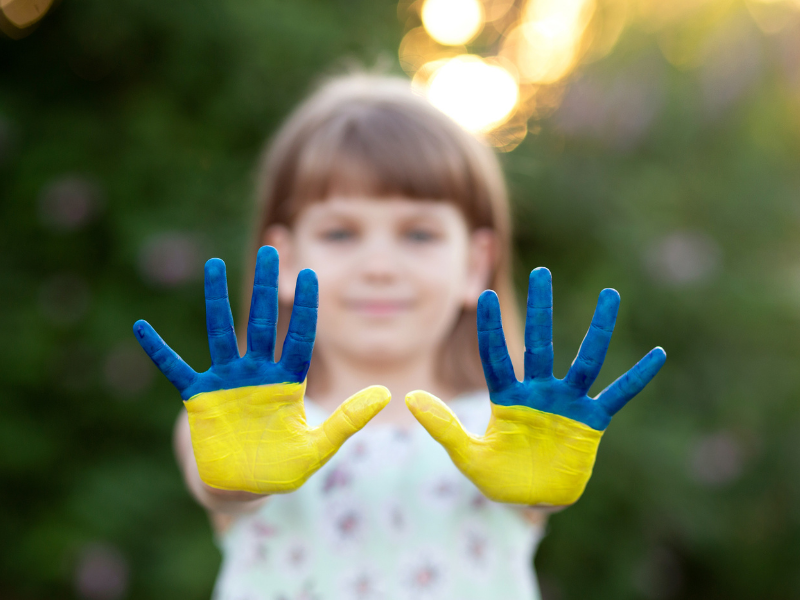Here are some tips to help navigate conversations with your children about the crisis in Ukraine.
Russia’s attack on Ukraine has sparked concern around the globe and people are feeling stressed and anxious wondering what will come next. That includes your children. While Ukraine is far away, your child is likely aware of the conflict and may be feeling nervous about the future. Sometimes our instinct is to avoid talking to kids about war and conflict because we don’t want to upset them. But your children need to hear from you, a trusted source, as opposed to social media or friends from school.
But how do you talk to them about such a sensitive topic?
1. Create a Safe Environment to Foster Conversation
It’s important to create a space where children know they can talk to you about difficult topics. Start by asking your child open-ended questions and let them guide the conversation — be open and nonjudgmental.
You could start a conversation by saying, “Have you heard anything about the conflict in Ukraine?” and “How does that make you feel?” Listen to your child’s answers without interrupting and without judgment. Meet your child where they are. Some children may have a lot of thoughts and feelings about Ukraine, and others may not. Always leave the door open for further discussion.
As a parent or guardian, try to have these conversations when you feel grounded. Children will notice if you are anxious or worried about world events. Make sure you’re limiting your own interactions with the news media and social media and practicing self-care techniques as well.
2. Give Honest and Accurate Information
Children may understand – both contextually and empathetically – more than you’d expect. Give your children accurate and age-appropriate information about Ukraine.
For young children, pull out a map and help them put their finger on Ukraine and Russia. Explain to your child that the two countries are fighting, and the conflict has caused difficult things to happen around the world. This could also be an opportunity to talk to your kids about how they handle conflict. Ask them what they do if they aren’t getting along with a friend at school, then talk about how to handle problems.
When speaking with young children, use neutral terms and try not to vilify entire groups of people. Remind them that each person is an individual and not all people think the same way.
You can have a more straightforward conversation with preteens. At this age, many children have already developed a sense of what is morally right and wrong and may want to voice those opinions. Give them room to speculate and share their concerns but remind them that much of the conflict is out of our control.
For high schoolers, understand that they’ve likely made up their minds on how they feel about the crisis. Reassure teens that they are safe and encourage them to talk about their feelings as the situation evolves.
3. Take a Break from the News
Although you may want to stay up to date with the news, be aware your child may be watching or listening, too. Constantly seeing violent or disturbing images can be distressing for children of all ages, so take time to disconnect and do other activities that bring you and your children joy. Go for a walk, cook a meal or complete a puzzle.
If you’re worried that your teenager is doomscrolling – constantly looking at social media for updates about bad news — encourage them to make smart media choices. Ask them which news sources they are following and why, and ask what coverage has helped them understand more about the conflict versus what made them more anxious.
4. Find Ways to Help
If your child is worried for families in Ukraine, think about things your family could do to help, such as giving to charities that are providing aid. Ask your child how they want to help, then work together to find a reputable organization that is providing aid to the people of Ukraine or find ways to raise awareness about the crisis within your community. You may be surprised by how much your child wants to volunteer to help the cause.
5. When to See a Professional
If you see dramatic changes in your child’s behavior, seek professional help. Reach out to a pediatrician, school counselor or mental health professional for support.
Look for signs of trouble sleeping, nightmares, recurring fears about death, separation anxiety, depression, irritability, headaches or stomachaches and changes in appetite.
6. Reassure Kids They Are Safe and Loved
Above all, make sure your child feels safe and loved. Tell them how much you love them. Ask your child what makes them feel secure – maybe it’s a blanket, sitting with family at the table or holding hands. If your child doesn’t feel safe, let them explain why.
One way to make children feel secure is sticking to a routine. Structure helps a child feel safe because they know what will happen and how you will respond. Establish consistent bedtimes and eating schedules and try to stick to them.
As a parent or guardian, our job is to make our children feel safe, loved and heard. As you navigate conversations with your children about the crisis in Ukraine,
remember that talking about difficult topics helps our children learn the importance of kindness and empathy.
Related
10 Ways to Help Your Kids When the World Feels Scary
Check out These 7 Anxiety Busters


